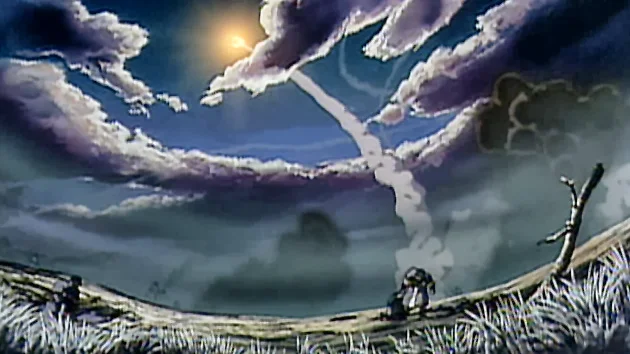James Cameron on Gravity: "it’s the best space film ever done"
Mr. Cameron's entitled to his opinion of course, but considering that lately he's taken to mistaking the size of his movie budgets for the size of his penis, can't hold his opinion in high regard.
I do offer an alternative--something I once wrote, scared up in hasty response:
Not impossible, spending an entire animated feature on a space mission; matter of fact it's been done before, with Hiroyuki Yamaga's magnificent Wings of Honneamise, about a fictional country on a parallel Earth struggling to send a man into space.
The level of thought, the density of detail and inventiveness of design the filmmakers (character designer Yoshiyuki Sadamoto and effects artist Hideaki Anno would later work on an even more ambitious project; actor-composer Ryuichi Sakamoto provided the thoughtful film score) pour into the film is staggering: the nozzle assembly of the Brobdingnagian engine resembles that of a Soviet Soyuz (Russian for 'rocket') engine; the country's entire society is fully realized, from the doughnut-shaped coins they drop into ticketing machines and triangular spoons used to eat thick stews to the faintly risible feathery caps worn by the space cadets, giving them a faint resemblance to blue flamingos.
The film's tone isn't one of relentless scientific optimism. The space force doesn't enjoy a high reputation; if anything, people regard it as something of a joke. The cadets and scientists have to earn the right to be proud of themselves, work hard to solve all technological problems, undergo rigorous training, stay above the local and international political intrigues that threaten to overwhelm the program.
By film's end said intrigues do take over--war breaks out on the border, and we're treated to the sight of gigantic armored engines and fleets of fighter planes mobilizing into action. Missiles are launched, artillery shells fired, and while high calibre ordnance trace their deadly trajectory through the brilliant blue sky, the scientists (who in any lesser picture would have canceled the program 'in the interest of safety' (pfui!) decide to push through and launch the sucker anyway.
The launch is impressive, a symphony of clashing metal and surging fire; the thousand-ton technological tower shudders and takes to the heavens in an agonizingly slow climb, accelerating into a streak of smoke and flame. The space traveler (the uchunaut?) peers out his tiny window and sees--well, sees the Earth: a vast swirl of cloud and water (and occasional bar of land) down below, bizarrely still (considering the battleground he left behind just minutes before), impossibly beautiful. And he has what the very best science fiction (as opposed to slam-bang thank you ma'am sci-fi) is able to deliver, thanks to a simple change of perspective (in this case some hundred miles straight up): an epiphany. We are just ants in an immense world, he realizes; whatever we do is insignificant, whatever hates and lusts we inflict on each other unimportant. We do not truly matter, and the sooner we realize that, the better off we will be...
A far cry from Gravity's unmistakeable (if understated) one-woman triumphalism, which for all the size of its budget and elaborate effects, seems oddly unambitious. "The only true wisdom is in knowing you know nothing" Socrates once said; in which case, watching Honneammise, where a prodigious amount of work and money and talent expended leads us to this humbling conclusion, would make for a good first step.
10.9.13




No comments:
Post a Comment